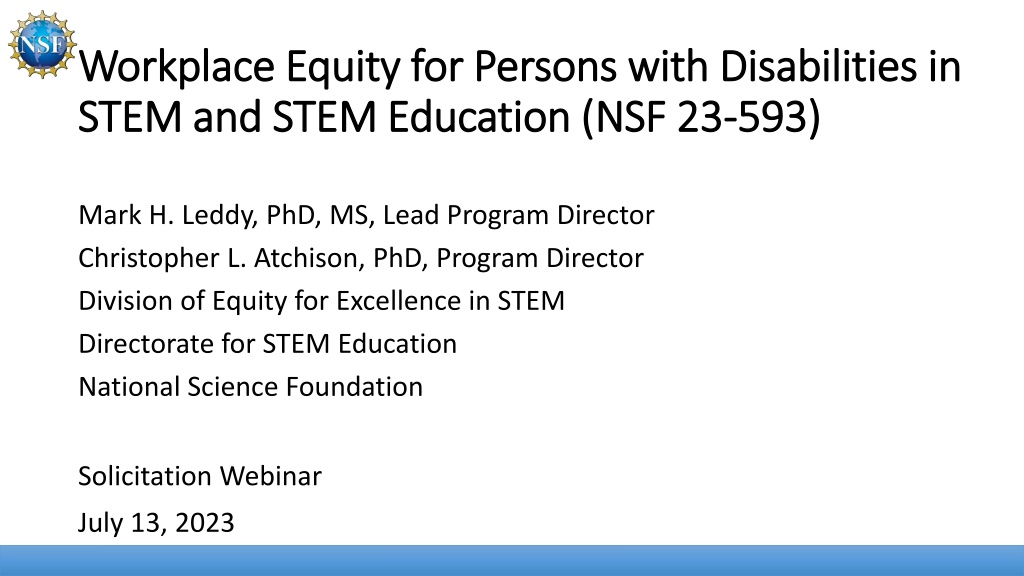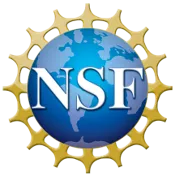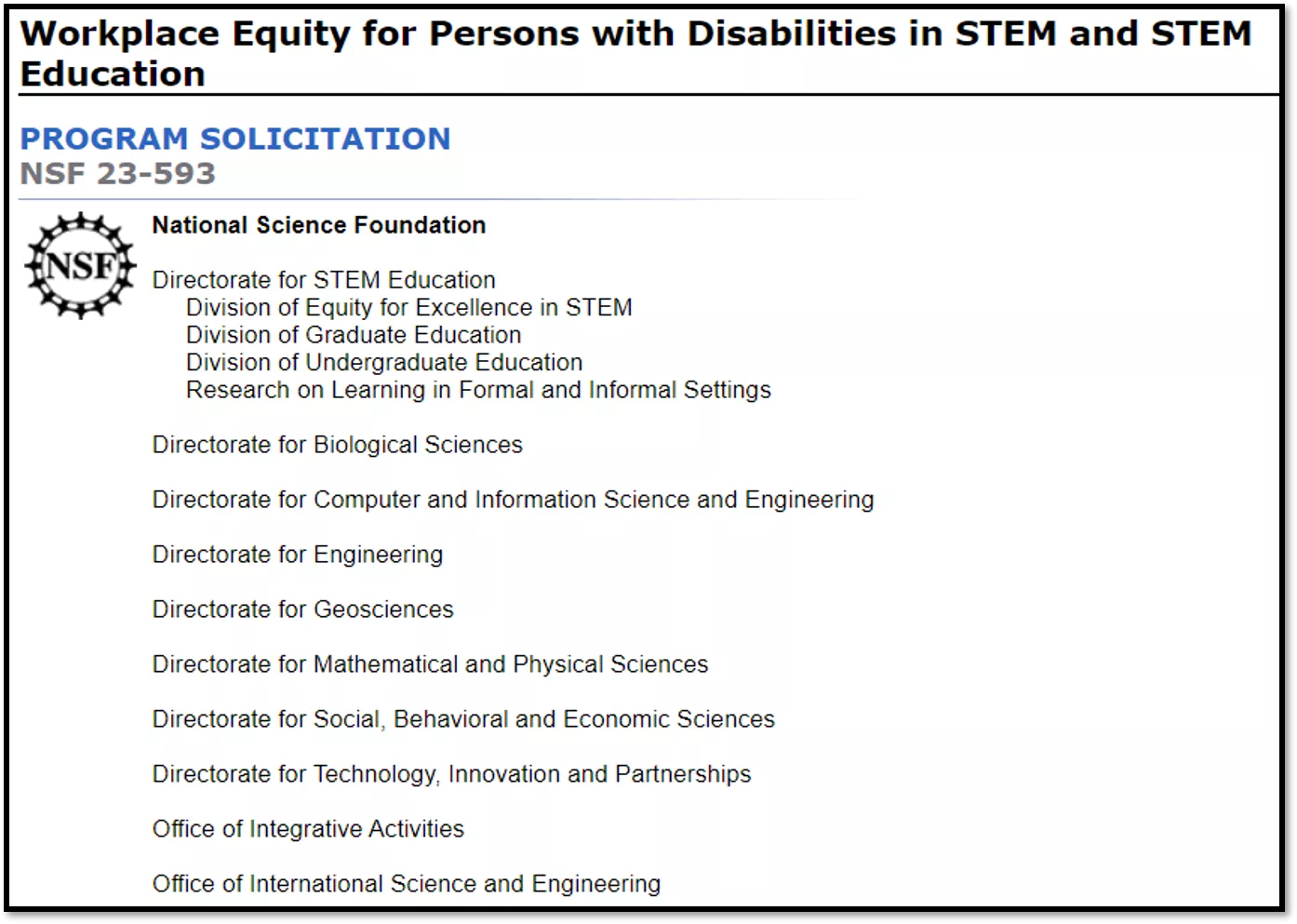Promoting Workplace Equity for Persons with Disabilities in STEM
Research in this solicitation focuses on studying barriers and solutions to diversity, equity, inclusion, and accessibility within the STEM workplace. It emphasizes the importance of applying intersectional social identity perspectives and conducting translational research to improve workplace equity for persons with disabilities. Key project design components, eligibility information, and proposal types are outlined to encourage submissions from a variety of organizations. The program aims to promote a more inclusive environment in STEM and STEM education for individuals with disabilities.
Download Presentation

Please find below an Image/Link to download the presentation.
The content on the website is provided AS IS for your information and personal use only. It may not be sold, licensed, or shared on other websites without obtaining consent from the author. Download presentation by click this link. If you encounter any issues during the download, it is possible that the publisher has removed the file from their server.
E N D
Presentation Transcript
Workplace Equity for Persons with Disabilities in Workplace Equity for Persons with Disabilities in STEM and STEM Education (NSF 23 STEM and STEM Education (NSF 23- -593) 593) Mark H. Leddy, PhD, MS, Lead Program Director Christopher L. Atchison, PhD, Program Director Division of Equity for Excellence in STEM Directorate for STEM Education National Science Foundation Solicitation Webinar July 13, 2023
3 Research Themes 3 Research Themes Studying barriers and/or solutions to diversity, equity, inclusion and accessibility (DEIA). Applying intersectional social identity perspectives to investigate characteristics and conditions that limit and/or improve DEIA. Conducting use-inspired and solution-oriented translational research about DEIA.
6 Key Project Design Components 6 Key Project Design Components 1. 2. 3. Researchers, experts, and/or organizations with disability experience. Disability type(s) to be investigated. STEM and/or STEM education workplace(s) and/or postsecondary training setting(s). Theoretical and/or conceptual framework(s), research hypotheses, questions, designs, methodologies, data analyses, and data interpretation plans. Assessment of project success. Accessible dissemination of knowledge and/or practice outcomes to traditional and new audiences. 4. 5. 6.
Eligibility Information: Who May Submit Eligibility Information: Who May Submit Institutions of higher education Non-profit, non-academic organizations For-profit organizations, including small businesses State & local governments, including school districts Tribal governments
PI and Organizational Eligibility Information PI and Organizational Eligibility Information NO limits or restrictions on who may serve as PI. NO limits or restrictions on the number of proposals per organization. NO limits or restrictions on the number of proposals per PI or Co-PI.
5 Proposal Types 5 Proposal Types Research Synthesis Conference EArly-concept Grants for Exploratory Research (EAGER) Rapid Response Research (RAPID)
Full Proposal Deadline and Target Date Full Proposal Deadline and Target Date Research and Synthesis Full Proposals Due Tuesday, September 19, 2023 By 5pm submitter s local time Conference, EAGER, and RAPID Proposals Target date is Tuesday, September 19, 2023 May be submitted before, on, or after target date
NSF Merit Review Criteria NSF Merit Review Criteria Intellectual Merit: This criterion encompasses the potential to advance knowledge. Broader Impacts: This criterion encompasses the potential to benefit society and contribute to the achievement of specific, desired societal outcomes. Data Management and Postdoctoral Researcher Mentoring Plans Additional Solicitation Review Criteria
Elements of NSF Merit Review Criteria Elements of NSF Merit Review Criteria 1. What is the potential for the proposed activity to: a. Advance knowledge and understanding within its own field or across different fields (Intellectual Merit); and b. Benefit society or advance desired societal outcomes (Broader Impacts)? 2. To what extent do the proposed activities suggest and explore creative, original, or potentially transformative concepts?
Elements of NSF Merit Review Criteria Elements of NSF Merit Review Criteria 3. Is the plan for carrying out the proposed activities well-reasoned, well-organized, and based on a sound rationale? Does the plan incorporate a mechanism to assess success? 4. How well qualified is the individual, team, or organization to conduct the proposed activities? 5. Are there adequate resources available to the PI (either at the home organization or through collaborations) to carry out the proposed activities?
Research & Synthesis Specific Review Criteria Research & Synthesis Specific Review Criteria 1. 2. 3. Researchers, experts, and/or organizations with disability experience. Disability type(s) to be investigated. STEM and/or STEM education workplace(s) and/or postsecondary training setting(s). Theoretical and/or conceptual framework(s), research hypotheses, questions, designs, methodologies, data analyses, and data interpretation plans. Assessment of project success. Accessible dissemination of knowledge and/or practice outcomes to traditional and new audiences. 4. 5. 6.
Authentic Leadership and Partnerships Authentic Leadership and Partnerships Include people with disabilities on the project team: Researchers and senior staff Other personnel, staff, and expert consultants Postdoctoral research scholars Graduate students Undergraduate students Advisory board members
Disability Types Disability Types D/deafness or hearing loss Blindness or visual impairment Physical Mental health Medical or other health-related disabilities Neurodiverse or cognitive conditions: Dyslexia, Autism spectrum disorders, Learning Disabilities, and others Multiple disabilities
Workplaces and Training Settings Workplaces and Training Settings Private, public, & government-funded research centers and laboratories, businesses, & industries Undergraduate, graduate & postgraduate college & university classrooms, labs, & research facilities Field stations & remote sites, observatories, polar facilities, research aircraft, & sea-going vessels PreK-12 classrooms & learning environments Tribal & indigenous facilities & environmental settings
Theoretical and Conceptual Frameworks Theoretical and Conceptual Frameworks Robust research hypotheses, questions, designs, methodologies, data analysis & data interpretation Required foundation for robust research methods May also align with indigenous traditional ecological knowledge & community-based participatory research Intersectional perspective, framework, or theory Critical disability theory Universal design principles
Project Assessment and Evaluation Project Assessment and Evaluation Plan for soliciting & addressing feedback, for example: Internal and/or external advisory board(s) Internal and/or external evaluation plan(s) Other evaluative mechanisms Rationale for assessment mechanisms Plan for objective assessment activities Description of how assessment will inform project modifications and improvements
Dissemination for Knowledge Advancement Dissemination for Knowledge Advancement How results, findings, outputs, and outcomes advance knowledge AND contribute to practice or policies Creative approaches to reach broad audiences, in addition to peer-reviewed publications Communication plan: Specific audiences, channels, media, and technologies Bring findings to mainstream communities in 508 compliant and accessible formats
Research Theme 1: Barriers and Solutions Research Theme 1: Barriers and Solutions Studying the Barriers and Solutions to Diversity, Equity, Inclusion, and Accessibility in STEM and STEM Education Workplaces and Training Settings for Persons with Disabilities
Research Theme 2: Intersectional Perspectives Research Theme 2: Intersectional Perspectives Applying Intersectional Social Identity Perspectives to Investigate Characteristics and Conditions of STEM and STEM Education Workplaces and Training Settings for Persons with Disabilities
Research Theme 3: Adapt, Adopt, Translate Research Theme 3: Adapt, Adopt, Translate Conducting Use-Inspired and Solution-Oriented Translational Research about Diverse, Equitable, Inclusive, and Accessible STEM and STEM Education Workplaces and Training Settings for Persons with Disabilities
Research Examples: Barriers Research Examples: Barriers 1. Physical and technological barriers limiting work or training, and/or restricting equipment use 2. Socio-cultural factors adversely impacting thoughts, attitudes, and behaviors about people with disabilities 3. Policies and practices that are implicitly or explicitly biasing against people with disabilities
Research Examples: Solutions Research Examples: Solutions 1. Solutions to eliminate physical or technological barriers that restrict equipment use 2. Intervention to mitigate negative socio-cultural factors impacting attitudes and behaviors 3. Policy and practice changes that mitigate or eliminate biases that limit persons with disabilities
Proposal Preparation and Submissions Proposal Preparation and Submissions Instructions Instructions Research.gov or Grants.gov submissions Project Summary Project Description Budgets and Budget Justification Special Information and Supplementary Documentation
Research.gov or Grants.gov submission Research.gov or Grants.gov submission NSF FastLane is no longer a submission option Research.gov NSF Proposal and Award Policies and Procedures Guide (PAPPG) Required use for collaborative proposals Grants.gov NSF Grants.gov Application Guide
Project Summary Guidelines Project Summary Guidelines Overview (Research issue or project purpose) Research theme & 6 project design components Intellectual Merit (Advance knowledge potential) Research goals, hypotheses, questions, designs, methodologies, data analyses, data interpretation Broader Impacts (Benefit society & outcomes) Outcomes for individuals & communities; brief communication & dissemination plan overview
Project Description Guidelines Project Description Guidelines Introduction Literature review Research plan Assessment and evaluation plans Leadership, management & organization resources Dissemination & communication plan Results from prior NSF Support Broader Impacts
Budgets and Budget Justification Budgets and Budget Justification Voluntary committed cost sharing is prohibited Budget request is driven by scope of activities Include Line E. Travel, 1. Domestic for an annual two-day awardee meeting PI +1 project team member All undergraduates, graduate students, & postdoctoral researchers working on the project
Special Information and Supplementary Special Information and Supplementary Documentation Documentation No appendices No letters of support or endorsement Data Management Plan Postdoctoral Research Scholar Mentoring Plan Letters of collaboration
Special Award Conditions Special Award Conditions The grantee is required to share requested materials and data, as allowed by the policies of the institutions, organizations, or federally recognized Tribal and Indigenous communities, with an NSF funded resource hub and/or a third- party evaluator if and when requested to do so.
Requests for Reasonable and Accessibility Requests for Reasonable and Accessibility Accommodations Accommodations NSF Proposal and Award Policies and Procedures Guide (PAPPG): Chapter II, Section A.2. Proposal accommodations: NSF Office of Equity and Civil Right s Disability Program Manager at rarequest@nsf.gov Accessibility accommodations: NSF Section 508 Compliance Officer at kotts@nsf.gov At least 30 calendar days prior to a proposal deadline
Facilitation Awards for Scientists and Engineers Facilitation Awards for Scientists and Engineers with Disabilities (FASED) with Disabilities (FASED) Proposal & Award Policies & Procedures Guide (PAPPG) NSF 23-1, Chapter II, F.7.
Directorate for STEM Education Directorate for STEM Education Dear Colleague Letters Dear Colleague Letters Dear Colleague Letter: Research to Improve STEM Teaching, Learning, and Workforce Development for Persons with Disabilities (NSF 21-114) Dear Colleague Letter: Persons with Disabilities STEM Engagement and Access (NSF 21-110)
Workplace Equity for Persons with Disabilities in Workplace Equity for Persons with Disabilities in STEM and STEM Education (NSF 23 STEM and STEM Education (NSF 23- -593) 593) Mark H. Leddy, mleddy@nsf.gov, (703) 292-4655 Christopher Atchison, catchiso@nsf.gov, (703) 292-2154 Division of Equity for Excellence in STEM Directorate for STEM Education, National Science Foundation Solicitation Webinar, July 13, 2023








